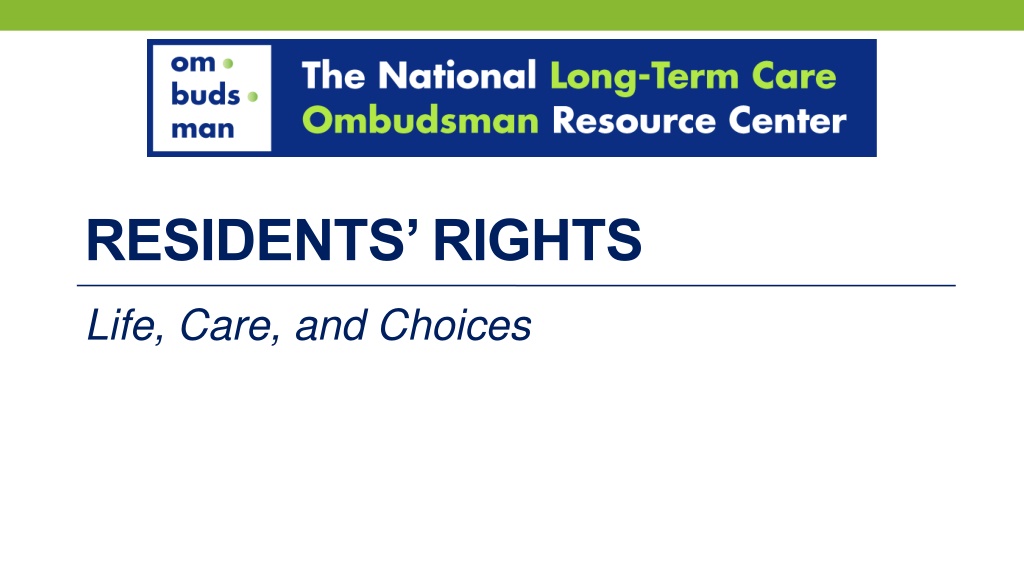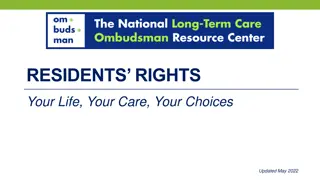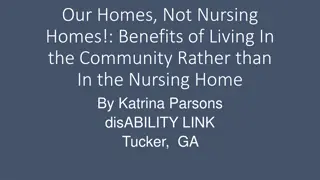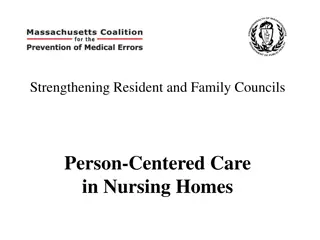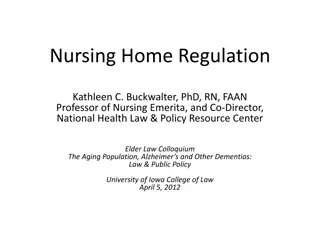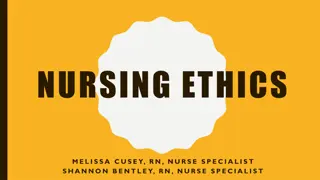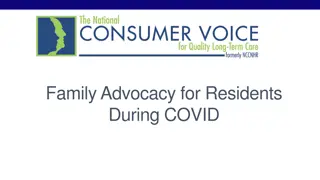Understanding Residents' Rights in Nursing Homes
Residents of nursing homes have additional rights beyond those as U.S. citizens. These rights, known as Residents Rights, are legally protected by federal law to ensure quality care and promote dignity, self-determination, and choice. Knowing and exercising these rights empowers residents to make decisions about their care and life, enhancing their overall well-being.
Download Presentation

Please find below an Image/Link to download the presentation.
The content on the website is provided AS IS for your information and personal use only. It may not be sold, licensed, or shared on other websites without obtaining consent from the author. Download presentation by click this link. If you encounter any issues during the download, it is possible that the publisher has removed the file from their server.
E N D
Presentation Transcript
RESIDENTS RIGHTS Life, Care, and Choices
Did You Know? Residents of nursing homes have rights in addition to rights as a U.S. citizen or resident? This additional set of rights, called Residents Rights, is legally protected by federal law? The nursing home must protect and promote all of your rights? Exercising your rights can help ensure you have the quality of care and life you want and need?
Consider These Situations You like to stay up late and get up mid-morning. Staff tell you that if you want to have breakfast, you must be in the dining room by 8 AM. Staff ask for your input on your plan of care, but your only means of communicating is to move your head. You have more to share, but can t without proper support. Your nursing home has a weekly church service open to all residents. You ask the staff about inviting a rabbi to lead a service and are told no. Can anything be done? Yes! Residents Rights give you the right to have your needs met and your preferences respected.
Residents Rights Have Impact Knowing and exercising your rights enhances quality of life and care through: Dignity Self-Determination Choices Information Communication and access to persons and services inside and outside the nursing home
Residents Rights Empower and Recognize Residents Residents Rights* put you in the driver s seat to choose, participate, receive information, and make decisions about all aspects of your care and life. Congress created residents rights* in recognition of: The power imbalance between residents and staff; and The tendency of nursing homes to operate as an impersonal system which required residents to fit-in. * See 42 CFR 483 for a full listing of Residents Rights. Many states also have residents rights laws or regulations which give additional rights to residents.
Residents Rights Overview* To get started, you might: Pick topics that interest you (see following slides) or; Focus on a situation you re facing and ask yourself, What are my residents rights? *This overview does not include all of your residents rights. See 42 CFR 483 for a full listing.
Right to Exercise Rights As a resident of the facility and as a citizen of the United States. Without interference, coercion, discrimination, or retaliation.
Right to Dignity Be treated with dignity and respect. Equal access to quality care. Freedom from abuse, neglect, and exploitation. Freedom from physical or chemical restraints. A safe environment.
Right to Choices About Care Help develop your own care plan Ask for care plan meetings and choose who attends Choose your own doctors and specialists Refuse or stop treatment or medication Be free of physical and chemical restraints
Right to Choices About Personal Space A safe environment with personal belongings, where possible. Easy access to the call light. Furniture and equipment that is functional for your needs. Share a room with another consenting resident.
Right to Choices About Lifestyle Make choices about your schedule, personal care, and activities. Designate or revoke a surrogate decision-maker. Organize or participate in family or resident groups in the facility.
Right to Be Fully Informed Risks and benefits of proposed care, treatment, and treatment alternatives Changes to the plan of care Changes in medical or health status Notices in a language and format you understand (e.g., Spanish, Braille, etc.) Access to personal and medical records Contact information for your physician, specialists, and all relevant agencies, including the state regulatory agency and the Long-Term Care Ombudsman Program
Case Study #1 Mr. Holman, a resident at your facility, has started saying he does not want to take his blood pressure medication. He has been on this medication for many years, and his high blood pressure is an ongoing issue. His daughter calls and checks daily to make sure he has taken his medication. As the days progress, Mr. Holman is increasingly upset about taking his medication. What should you do?
Case Study Questions 1. Which residents right does this scenario involve? There can be more than one right involved. 2. Who has decision-making authority over whether the resident can exercise this (or these) right(s)? 3. How can you work toward promoting the resident s rights in this scenario?
Right to Access Access people, services, and activities inside and outside the facility Visitors you want, at any time you choose See your doctor, specialists, or representatives of the state survey agency or Long-Term Care Ombudsman Program Participate in social, religious, and community activities inside and outside the facility
Case Study #2 Ms. Smith, a resident at your facility, has started spending time with a new friend who does not live at the facility. Her friend usually comes late in the day, after dinner. Sometimes her friend does not leave until very late in the evening. The friend s presence disrupts the evening rounds, and although staff have told Ms. Smith that visiting hours are in the afternoon, the friend continues to come late in the evening.
Case Study Questions 1. Which residents right does this scenario involve? There can be more than one right involved. 2. Who has decision-making authority over whether the resident can exercise this (or these) right(s)? 3. How can you work toward promoting the resident s rights in this scenario?
Right to Manage Finances Manage your financial affairs Receive financial statements and information about services and charges Have excess personal funds deposited in a separate interest-bearing account
Right to Privacy Privacy in communication - oral, written, or electronic - with any person the resident chooses. In personal, financial, and medical affairs. During treatment and care of personal needs.
Right to Make Complaints Make complaints to the facility Ask staff to take steps to resolve complaints Make complaints to outside agencies like the state survey agency or the Long- Term Care Ombudsman Program
Rights to Remain You have the right to stay in the facility unless specific conditions are met, such as transfer or discharge is necessary for your health and safety or the health and safety of others Appeal your discharge notice and remain in the facility until the appeal is decided Receive a 30-day written notice of discharge that includes information like: The reason for discharge, the date of discharge, the location to which you will be discharged, your rights, and name and contact information for the Long-Term Care Ombudsman Program and the Protection and Advocacy Program (for residents with intellectual or developmental disabilities or mental health needs)
Rights to Remain Preparation and orientation to ensure a safe and orderly discharge Notice of your right to return to the facility after a hospital stay or therapeutic leave, including bed hold policies, and a statement of your right to return to the same bed (if available) or the first available bed
Are There Limit? Residents can exercise your rights as long as they don t infringe upon the rights or health and safety of other residents.
What is the Nursing Home Required to Do? Post information about residents rights, explain them, and give residents a copy in a language and format they can understand. Protect and promote the rights of each resident. Ensure that the resident can exercise his or her rights without interference, coercion, discrimination, or reprisal from the facility. Treat each resident with respect and dignity. Care for each resident in a manner and environment that maintains or enhances the resident s quality of life, according to the resident.
In a Nursing Home That Promotes Rights Residents, surrogate decision-makers, and staff know residents rights. Staff assist residents in exercising their rights. Staff know the residents as people, e.g., their needs, preferences, and natural rhythms. Alternate modes of communicating are used with residents who, e.g., are non- English speaking or have hearing or visual impairments.
In a Nursing Home That Promotes Rights Information and choices are provided. A diversity of food and activities are offered. Person-centered care is practiced as a way of life. Staff and residents treat each other with dignity and respect. Staff and residents are happier.
Tips for Nursing Home Staff Talk with your residents. Ask them if they have a preference or a need that has not been met. Talk with friends and family of residents who may have difficulty communicating preferences to get a sense of their typical preferences. Help residents understand their rights and let them make choices wherever possible. If a resident s right is not being honored, talk with your supervisor about ways to address the issue. Make sure residents know about their local long-term care ombudsman and have information on how to file a complaint.
Residents Rights Quiz: True or False? 1. Residents must follow doctor s orders. 2. When a resident is in a nursing home, he or she must eat at the meal times set by staff, even if breakfast is at 8am and they would never eat that early. 3. Residents must communicate their input to the facility using only written or oral communications, even if they can only communicate through motion. 4. Residents only choice of religious activity is the weekly church service at the nursing home, even if it is not affiliated with their religion. 5. A resident only can use the facility s grievance process to resolve a problem.
Residents Rights Quiz: True or False? 1. False: Residents have the right to make decisions about their care and treatment. The resident has the right to be fully informed and to make decisions in all aspects of his/her life that are significant to him/her. Residents must be informed of the risks and benefits of any care, treatments, or orders, and s/he has the right to refuse. 2. False: Residents can eat at their desired meal times, even if they are different from the scheduled meal. Residents have the right to make choices about their schedule, including meal times. 3. False: The facility must take resident input into consideration and provide any support or assistance they need to communicate they input. Residents have the right to information and communications in a language and format they understand (e.g., Spanish, Braille, etc.).
Residents Rights Quiz: True or False? 4. False: Residents can practice the religion of their choosing, regardless of the facility s scheduled religious services. Residents have the right to freely practice their own religion, can attend religious services outside the facility, and can have visitors at any time, including clergy. 5. False: The facility must investigate and respond to any grievance filed by a resident, including letting them know how the problem will be resolved. Residents can file a grievance with the facility, make a complaint to the state licensing and survey agency and/or the Long-Term Care Ombudsman Program.
Additional Information The National Long-Term Care Ombudsman Resource Center (NORC) http://ltcombudsman.org/ NORC Nursing Homes page- http://ltcombudsman.org/nursing-homes NORC Federal Nursing Home Regulations page- http://ltcombudsman.org/library/fed_laws/federal- nursing-home-regulations Locate and Learn about the Long-Term Care Ombudsman Program: http://theconsumervoice.org/get_help The National Consumer Voice for Quality Long-Term Care (Consumer Voice) www.theconsumervoice.org Consumer Voice Nursing Home Residents page- http://theconsumervoice.org/issues/recipients/nursing-home-residents
Contact Information INSERT PRESENTER CONTACT INFORMATION
Connect with us: www.ltcombudsman.org cid:image003.jpg@01CFB310.A36779F0 The National LTC Ombudsman Resource Center cid:image004.jpg@01CFB310.A36779F0 @LTCombudcenter Get our app! Search for "LTC Ombudsman Resource Center" in the Apple Store or Google Play This project was supported, in part, by grant number 90OMRC0001-01-00, from the U.S. Administration for Community Living, Department of Health and Human Services, Washington, D.C. 20201. Grantees undertaking projects under government sponsorship are encouraged to express freely their findings and conclusions. Points of view or opinions do not, therefore, necessarily represent official Administration for Community Living policy.
